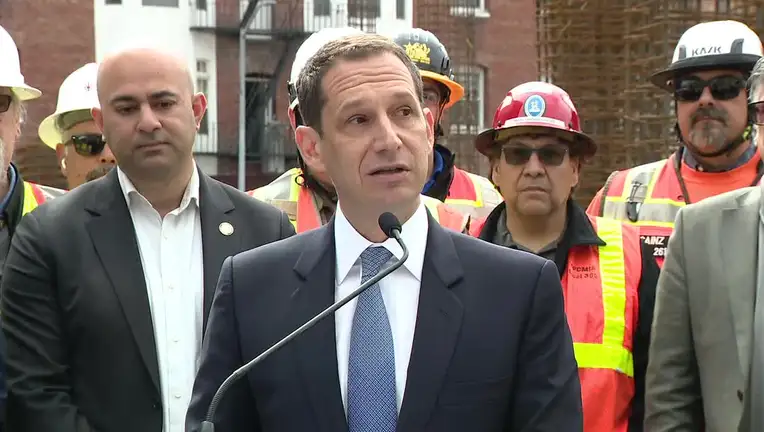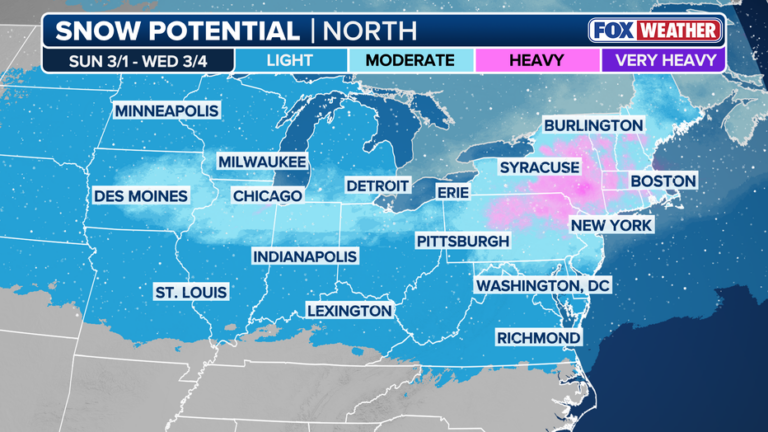A powerful storm system swept across the Great Plains and Midwest Wednesday, closing highways in western Kansas, spawning reported tornadoes in Nebraska and Iowa and raising concerns about fires because of unusually high temperatures.
The strong winds whipped up dust that reduced visibility to zero west of Wakeeney, Kansas, the state Department of Transportation said, and caused at least four semitrailers to blow over. Kansas officials closed Interstate 70 from the Colorado border to Salina, as well as all state highways in nine counties in northwest Kansas.
The National Weather Service said there have been 13 tornado reports in the Plains states, scattered through eastern Nebraska and Iowa. Winds topped 70 mph through much of Kansas, Nebraska and Iowa.
“To have this number of damaging wind storms at one time would be unusual anytime of year,” said Brian Barjenbruch, a meteorologist with the National Weather Service in Valley, Nebraska. “But to have this happen in December is really abnormal.”
The system came on the heels of devastating tornadoes last weekend that cut a path through states including Arkansas, Missouri, Tennessee, Illinois and Kentucky, killing more than 85 people.
The National Weather Service issued a high wind warning for an area stretching from New Mexico to upper Michigan, including Wisconsin and Illinois. Gusts topping 80 mph (129 kph) were recorded in the Texas Panhandle and western Kansas. The weather service said an automated observation site in Lamar, Colorado, recorded a gust of 107 mph (172 kph) Wednesday morning. Wind gusts of 100 mph were reported in Russell, Kansas.
Greg Butcher, the city administrator in Seward, Nebraska, said he was standing in his office at city hall Wednesday when he saw a giant wall of cloud rolling toward him. Butcher said he braced for a major hit but so far the worst damage appears to be a few toppled telephone poles.
“We lucked out,” Butcher said. “It came in really fast.”
Officials also warned of a dangerous fire risk along the western edge of the weather system, where conditions were dry.
A wildfire prompted Sheridan County officials to evacuate a few homes near Quinter in northwest Kansas. Emergency management director Don Koerperich did not have an estimate of how big the fire was but said “I’m glad it wasn’t near any towns.” Other fires were reported in Russell and Ellis counties.
Scientists say extreme weather events and warmer temperatures, much like what’s happening, are more likely to occur with human-caused climate change. However, scientifically attributing a specific event like this storm system to global warming requires specific analysis and computer simulations that take time, haven’t been done and sometimes show no clear connection.
“I think we also need to stop asking the question of whether or not this event was caused by climate change. All events nowadays are augmented by climate change,” said Northern Illinois University meteorology professor Victor Gensini. “We need to be asking, `To what extent did climate change play a role and how likely was this event to occur in the absence of climate change?’”
The unusually warm temperatures on Wednesday were due in part to record high ocean temperatures in the Gulf of Mexico, which wouldn’t have happened without global warming, said Jeff Masters, a Yale Climate Connections meteorologist who cofounded Weather Underground.
“That record heat is helping feed heat and moisture into today’s storms, increasing their damage potential,” he said.
Damaging winds were likely to bring down trees and power lines, leading to power outages, the National Weather Service warned. Some schools in Kansas, Nebraska and Iowa either canceled in-person classes or closed early.
Officials in Ashland, Kansas, shut down the town’s power supply for a few hours to reduce the threat of fire after multiple power poles were knocked down.
The system blew into the Plains from Colorado, where high winds knocked out power, closed roads and highways and delayed or canceled hundreds of flights. The weather service said a wind gust of 100 mph (160 kph) was recorded on the airfield at the Air Force Academy in Colorado Springs.
Blaire Brush, a spokeswoman for the military academy, said windows on multiple cars and buildings were shattered during the windstorm. She did not know if the windows were smashed by objects flung by the wind or from the force of a gust.
On nearby Interstate 25, more than a dozen semitrailers blew over in winds that topped 90 mph (145 kph), according to the Colorado Springs Gazette.
In the Southwest, strong winds took down power lines in Shiprock, New Mexico, knocking out power to residents across the Navajo Nation.
Blowing dust drastically cut visibility in the Texas Panhandle, where Sherman County Sheriff Ted Allen said all roads in and out of the county were closed. In the Oklahoma Panhandle, the state Department of Transportation reported the main road north from Boise City into Colorado was closed because of collisions and downed power lines.
The winds and storms were expected to move quickly east, Thies said. After that, forecasters expect temperatures to plunge, with below freezing temperatures in the northern Plains.
(AP)











